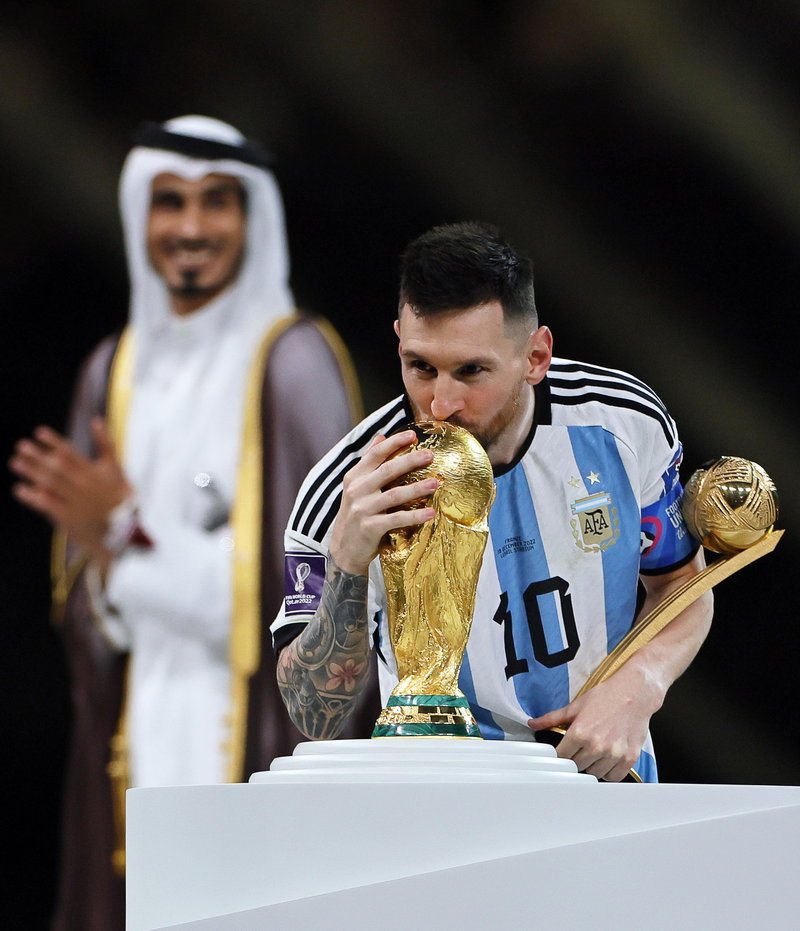Messi crowned
The presenter of El Punt Avui TV’s The Week in Football and Barça TV commentator, Barney Griffiths, tells the story of a Barça legend’s final glory
THE BALLETIC LITTLE MAGICIAN HAD OTHER IDEAS, AND ARGENTINA WENT ON TO TOP THEIR GROUP IT WAS THE FIRST WORLD CUP FINAL TO BE DECIDED ON PENALTIES SINCE 1994
Well, we were going to try not to mention the Qatar World Cup, weren’t we? But after Barça legend Leo Messi rounded off a magnificent career with an equally magnificent World Cup win with Argentina, it felt churlish not to dedicate a few lines of this magazine to the great man’s achievement. And some achievement it was, given the sky blue and whites’ start to the competition, a 2-1 defeat to minnows Saudi Arabia. Many thought that was it, and Messi was destined to be one of the greatest ever players – if not the best – never to lift a World Cup. But the balletic little magician had other ideas, and Argentina went on from that chastening defeat in the opening game to top their group after 2-0 wins against Mexico and Poland.
The team was coached by another Lionel, former player Scaloni, who himself was in severe danger of becoming a pariah following that opening defeat. In the round of sixteen they played a valiant but ultimately lacking Australia, and were vastly superior despite the close 2-1 scoreline.
Then came the quarter finals and their sternest test yet: Van Gaal’s Netherlands. Now if you were to ask locals which former Barça man is held in greater esteem in these parts, then you would be dismissed as a bobo, given that Messi’s stellar reputation dwarves that of the Dutch former coach, who was never taken to Catalan hearts. Despite his worldwide reputation as an astute coach, his most famous words here in Catalonia – still repeated in jest by football fans today – were addressed to a critical journalist in a post-game press conference “Siempre negatifo!” (the Spanish word negativo mispronounced in Van Gaal’s accent, and meaning “Always negative!”). The red-faced one didn’t do himself too many favours here either, dissing Messi prior to the game by suggesting the Argentine captain was a weakness due to his not putting in the defensive work when his team didn’t have the ball, and then suggesting the Netherlands would prevail if it came to penalties. The result? A record-breaking 18 yellow cards in the game, which many commentators attributed to the Argentines being riled by Dutch arrogance, while others – among them Messi himself in a post-game on-field interview – suggested that the Spanish international referee, Antonio Mateu Lahoz, was not up to the task of officiating such an important and tension-filled game. Oh, and Argentina won on penalties, with some players famously taunting the opposition after the last spot kick was taken, and Messi uttering the now famous words “Qué miras bobo?” (What are you looking at, stupid?) to one of the onlooking Dutch players during a post-match interview.
That spat behind them, Argentina were into the semi-finals, where they had been widely expected to face Brazil, the darlings of footballing aficionados everywhere, in what was to be a classic South American World Cup showdown. But Croatia, the country that bats far above its average when it comes to football, had other ideas. After losing to France in the final last time round, Modric, Kovacic et al. were aiming to make it two finals in a row. A last-gasp extra-time equaliser against Brazil had taken their quarter final to penalties, which they had subsequently won, leaving the dreams of head coach Tite and star player Neymar on the scrap heap. Argentina proved a bridge too far for the Croatians, however, and Messi led his side triumphantly into the final with a comfortable 3-0 win.
And then came one of the greatest World Cup finals ever witnessed. Given the world’s need for heroes, it was billed as Messi against the young pretender Mbappé, rather than Argentina vs the holders France, and on paper Didier Deschamps’ side looked the more likely winners, having themselves had a mostly untroubled route to the final. It has to be said that neither player disappointed, even though it took the Frenchman some time to get going. Argentina had strolled into a 2-0 half-time lead and were in full control of the game until the 70th minute, it looking for all the world that France had simply failed to turn up on the biggest stage of all. But savvy football fans everywhere would have known that the Argentine dominance had come from immense endeavour in the first hour of the game – indeed, they seemed to be playing with an extra man or two at times – and that tiredness and substitutions would play a part in the final outcome. And so it came to pass. In the last 10 minutes of normal time France scored twice, through Mbappé, and could easily have won it as their substitutes started to impose themselves on the exhausted Argentines. The game had been turned on its head. But Messi and his team held on to take it to extra time, where they again took the lead through a Messi goal, his second of the final following an earlier penalty. Back came France again, with that man Mbappé completing his hat-trick, two from the penalty spot, one wonderful volley, to take us to penalties.
It was the first World Cup final to be decided on penalties since Brazil beat Italy in Pasadena in 1994. Was it Messi’s destiny to lift the trophy? To the delight not only of Argentines, but of football fans everywhere, and, yes, that includes culers, it was.
FOOTBALL

